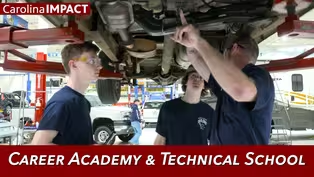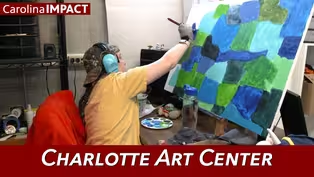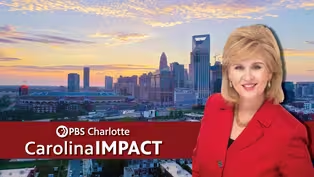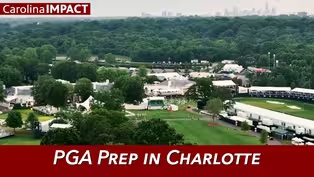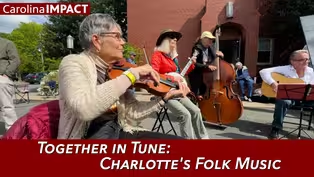
May 6, 2025 | Carolina Impact
Season 12 Episode 1225 | 27m 9sVideo has Closed Captions
PGA in Charlotte, Career Academy & Technical School, Charlotte Art Center, & Fun Through Folk Music.
One of golf's four major championships is coming to Charlotte: The PGA Championship; A Troutman school prepares students for careers through hands-on experience; Adults with intellectual and developmental disabilities connect with the community through art; & Charlotte's folk music unites generations with songs that transcend time and tradition.
Problems playing video? | Closed Captioning Feedback
Problems playing video? | Closed Captioning Feedback
Carolina Impact is a local public television program presented by PBS Charlotte

May 6, 2025 | Carolina Impact
Season 12 Episode 1225 | 27m 9sVideo has Closed Captions
One of golf's four major championships is coming to Charlotte: The PGA Championship; A Troutman school prepares students for careers through hands-on experience; Adults with intellectual and developmental disabilities connect with the community through art; & Charlotte's folk music unites generations with songs that transcend time and tradition.
Problems playing video? | Closed Captioning Feedback
How to Watch Carolina Impact
Carolina Impact is available to stream on pbs.org and the free PBS App, available on iPhone, Apple TV, Android TV, Android smartphones, Amazon Fire TV, Amazon Fire Tablet, Roku, Samsung Smart TV, and Vizio.
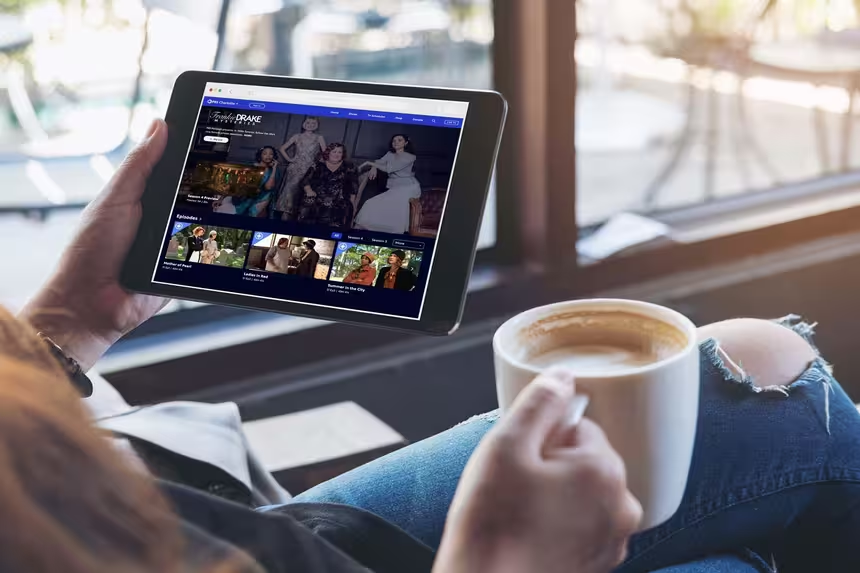
Introducing PBS Charlotte Passport
Now you can stream more of your favorite PBS shows including Masterpiece, NOVA, Nature, Great British Baking Show and many more — online and in the PBS Video app.Providing Support for PBS.org
Learn Moreabout PBS online sponsorship- [Announcer] This is a production of PBS Charlotte.
- Just ahead on "Carolina Impact," we take you behind the scenes of a major Charlotte Sporting event, plus how a Troutman School prepares students for careers through hands-on experiences, and there's more to folk music than you might think.
We explore how it brings local musicians together.
"Carolina Impact" starts right now.
(upbeat music) Good evening.
Thanks so much for joining us.
I'm Amy Burkett.
Long before the Panthers and Hornets came to town, Charlotte was well known for two other sports, auto racing, and golf.
Throughout the 1970s, the city hosted the PGA tour's annual Kemper Open, and for the last 20 plus years, hosted the annual WACHOVIA Championship, which later became the Wells Fargo Championship.
Coming up in mid-May, all eyes of the golfing world will once again be on our Queen city, but this time it's different "Carolina Impact's" Jason Terzis is here with all the details.
- Well, in the world of professional golf, there are tournaments practically every weekend of the year, but only four annual events are considered major championships and the most prestigious events of the year.
The Masters tournament, the US Open, the Open Championship, also known as the British Open and the PGA championship.
The Masters in Augusta, Georgia is the only one with a set location year in and year out.
The other three rotate where they're played, and this year Charlotte's Quail Hollow Club is hosting the PGA championship.
So we wanted to know what all goes into planning and pulling off a major sporting event such as this.
- [Jim] The PGA of America descends upon the Queen city and a venue with a brief but impressive history.
- [Jason] Charlotte born CBS sports commentator.
Jim Nance has always had a way with words.
- [Jim] Since 1916, the PGA championship has provided a myriad of spectacular images and moments.
- [Jason] Nance will be on the call for this month's PGA Championship at Quail Hollow Club just as he was in 2017.
- [Jim] Thomas with the finishing touches, - Quail Hollow Club itself showed itself truly as a major championship venue in 2017, we only had 12 players finish under par.
Justin Thomas won eight under.
- Something that I took away from 2017 was just, wow.
I mean, everything is just every minute of every day.
You're just sitting there going, wow, this is big.
(upbeat music) - [Jason] The Quail Hollow Club was founded in 1959, quickly growing into one of the country's elite golf courses.
It hosts an annual PGA tour event.
- Quail Hollow Club is my favorite stop on tour.
- [Jason] But this year it's hosting one of golf's four major championships.
- Major championship golf is much different than our annual event.
Yeah, while they are both very high level events and both televised all over the world, you know there's only four majors a year, so there's very little margin for error and the stage is quite large.
- To have a major championship called Burg Golf Course within Charlotte City limits this close to the airport, this close to uptown, South Park, Ballantyne all the hotels, restaurants.
It really allows our fans, our sponsors, our partners to have the best of both worlds.
Where you can come out here with the aesthetics of the Green Mile finishing holes, and then take advantage of the rest of the assets that Charlotte has to offer.
That's a really rare opportunity to have.
- With the event fast approaching, Quail Hollow has been a beehive of activity, the main parking lot looking more like a Home Depot.
There's metal pieces for scaffolding, all sorts of lumber, stages being erected, portable tents, a slew of U-Haul moving containers, giant portable generators of all sorts and sizes.
Even the PGA championship offices themselves are in a temporary facility.
- There's, you know, well over 600,000 square feet of structures are gonna be built out here.
Most of those floors tents are already up.
- [Jason] It's the same story on the course where construction crews are hard at work, moving equipment around erecting portable stands all while club members continue to play.
Jason Soucy is in charge of it all, serving as the PGA championship director, a position bestowed upon him more than two years ago.
- This will be the hundred seventh playing of the PGA championship, PGA of America's the Association of 30,000 members.
For me to be the steward of this championship to set up this team from scratch, to have that two year lead runway is definitely something I don't take lightly and it's really a true honor to be part of the team that's gonna deliver this championship for the PGA of America.
- Jason and his staff of 10 full-time employees have been working nonstop to get ready for the tournament using the design put in place by the team that ran the 2017 PGA championship.
- We had such success when we were here in 2017, so there already was a pretty significant blueprint set up for me for success.
- [Jason] An estimated 40,000 people a day are expected at the tournament, but without a parking garage on site, moving all those people in and out of Quail Hollow presents quite the challenge.
- Anyone who has a championship plus ticket for the day for the corresponding day of their ticket light rail service is gonna be free to them and we're gonna have a continuous shuttle operating from the Sharon Road West Station to get here to the property.
We also will have parking with partnerships, with car winds, with Ballantyne, with parks, a park expo center.
And then lastly, rideshare has changed dramatically.
One of the things that's different from 2017 for us is we were offsite with Rideshare in 2017.
This time around, we're gonna have rideshare right here on properties.
- [Jason] The event couldn't be pulled off without volunteers.
Some 3000 of them are committed to helping out.
- We're gonna have volunteers from 48 states and six countries.
So it's to see the outpouring, the support they give, the dedication that they have to travel even.
- [Jason] Inside the ropes and dealing with the actual golf part is Quail Hollow's director of Green and Grounds Keith Wood.
I asked him what's the first thing he thinks about each day when coming to the golf course?
- Oh, better question.
What keeps me up at night right?
- Yeah.
- The weather primarily is the main thing that can throw us a curve ball that we need to react to at almost any moment.
- [Jason] In the weeks leading up to the event, Keith and his greenskeeper have been doing a balancing act of sorts when it comes to course maintenance.
- The professionals really demand a course in certain type of condition and your clientele, your members mostly want the course in a different type of condition and we're trying to have everything balanced so that way two weeks out when the play comes off the golf course, we're able to grow the rough up without putting too much water on the property, we're able to firm the greens up and really speed the greens up so they get to major championship speed and then we do all the detail work to make the place as beautiful as we can make it.
- [Jason] What some people might find surprising as I did is that the tournament isn't sold out yet.
Some tickets still remain.
- We're instituting a brand new program for major sporting events that is only happening at the PGA championship right now where every single ticket we sell is gonna be food inclusive.
- [Jason] But sold out or not, the economic impact on the region will be huge.
- In 2017, we had a study done.
I think the impact was registered around $120 million.
I'm assuming we're gonna, well surpass that number this time around.
You know, 90% of the hotel rooms are gonna be full, you know, here during PGA championship week because I said like this is a national scope that's coming in.
We'll have a thousand temporary jobs that are created around the event at a minimum.
So that economic impact truly is why I think the community of Charlotte should be so thankful that Quail Hollow Club allows itself to kind of have this kind of impact.
- Okay.
Absolutely.
A huge production.
When's it all take place?
- Yeah, it's, it really is.
There's a lot that goes into it.
All right, so this all happens next week.
Golfers, spectators and all those volunteers will begin arriving in town this weekend.
Practice rounds and other events take place Monday, Tuesday, and Wednesday.
Tournament action begins next Thursday, May 16th with the four round tournament wrapping up Sunday the 18th.
Actually, I said the 16th.
It's the 15th.
One other note on all this, the 10 person staff, think of it almost like a political campaign all leading up to an election.
This staff is hired, they come in, they're here for two years, getting ready, all leading up to a major event, and then when the event is done, they're technically out of a job.
So then these people are basically like, okay, so they have to hopefully hook onto something else, just like a political campaign.
It all leads up to one big event.
The event's over and then, poof yeah, they're done and it's like- - And out of town.
- And out of town.
Yeah.
So they'll kind of all go their separate ways and hopefully hook on with another event down the road.
- Amazing.
Yeah, appreciate you sharing this with us.
- Okay.
- Well if you are a parent or a grandparent, you've likely watched your teens struggle to choose a career.
Sometimes the best way to figure it out is to give things a try, even if it's not what they want to do.
You're making progress.
"Carolina Impacts" Dara Khaalid and videographer, Russ Hunsinger take us to Troutman Vocational School to see how students are finding their paths.
(drill whirring) (upbeat music) - [Dara] It is a sight to see inside the career academy and technical school.
- Apply sealer to the throws of that bowl.
- [Dara] If you didn't know it was a high school classroom, you might think it's a real auto shop with cars high in the air on lifts, hands working under hoods, and thorough inspections of damage.
- When you bring a car to me, something like this, I can figure out how much it's gonna cost to fix.
I can figure out what needs to be fixed on there, any hidden damages, I can get to that, and provide it to the customer to figure out what they have to do to get this car new again.
So we have a little bit of damage right here.
- [Dara] These sharp collision estimating skills you see senior Wyatt Donahue using were learned right here in the automotive technology program.
- There's not really like big schools that you can go do to learn estimating.
You kind of just are pushed into it and figure it out, but with here, you have a lot of opportunities to figure it out.
In a safe environment, you can screw up, you can learn again.
- [Jason] And these lessons have been paying off since January months before he walks the stage.
- I'm working at Flow Collision in Statesville.
They have me set in line for a job the minute I graduate.
So the opportunity that I have is really, really great because I'm starting somewhere where I can learn and I can grow, and then once that job hits, I'm ready.
- The shifter up here actually has four bolts that holds the shifter assembly in.
- [Dara] Automotive instructor Justin Bennett says success stories like this are the norm because students are gaining skills that employers want.
- These are actually for the Kia that is here in Bay four.
- [Dara] Like being knowledgeable of parts and handling repair orders, but most importantly... - They don't ask for a student that can change a tire.
They want students that can show up on time that know how to communicate with a customer that can communicate with their employer.
So go ahead and pull the quarter pins out.
- [Dara] So by the time they graduate, they're fully prepared to head into jobs that have a starting salary around $26 an hour.
That's about $54,000 a year according to Indeed.
- Then as you work up and you start working on more complicated systems and making more complicated repairs, you can actually grow quite a large salary.
So if you get into a larger dealer network, especially in some of your larger cities in North Carolina, there is no reason a good technician won't make six figures a year.
- [Dara] This is one of the higher paying industries that students can step into right outta high school.
(upbeat music) But there's also welding where the starting salary is around $23 an hour.
- It's a huge need.
I have people coming in here every day calling me, looking for welders.
- [Dara] In the program, students learn the three basic processes of welding.
- We also teach them fabrication skills, believe it or not, reading rulers how to cut metal, different things, how to plan out how to build something.
- [Dara] On top of that, they help students get important certifications that'll make them marketable to employers.
- I already have a few job openings in NASCAR for once I got all my certifications, so I'm hoping to move there.
- [Dara] The Career Academy and Technical School is a public school with the Iredell Statesville system.
It's designed for juniors and seniors.
Students split their day between here and their traditional high school where they do their core courses.
Once they arrive at the academy, their work shifts begin.
- We put a lot of emphasis on coming here on time, coming here every day, and we tell them, you know, we are preparing you for the real world and nobody's going to allow you to come to work late or miss work.
Tell me what you working on today.
- Well, we would just- - [Dara] Larry Rogers has been principal since 2011.
Throughout his time, he's taken it from three to 11 hands-on programs.
- [Larry] We built it based on the needs in our community and the needs nationally.
We look at national reports and try to create programs that not only fit our students, but also will fit in our community.
- [Dara] Some of those programs are pharmacy, tech, EMT, and firefighting, where students practice real scenarios in full gear using donated items from local departments.
(upbeat music) And then there's the culinary arts program where seniors like Sydney Thornhill use what they learn in the classroom.
- It's helped me a lot know my way around the kitchen in there and how to be safe when serving food, - [Dara] Which helps fuel the local economy.
- I actually work and help in food trucks.
- That is really good.
Sydney oh my gosh.
- [Dara] Her instructor Deneen Delavante couldn't be prouder.
- This is what we are here for.
This is what we do.
What I give these students is a taste of what my journey was like and their journey will take on its own form, but letting them know it's a safe place to do it.
Good job, Sydney.
That looks wonderful.
(upbeat music) - [Dara] So whether students' interests take them to a kitchen, a hospital room, or a podcast studio instructors say these teens are ready to enter the workforce right after graduation.
For "Carolina Impact," I'm Dara Khaalid.
- Thank you, Dara.
Principal Larry says, big changes are coming to the welding department in August after having to turn away 104 students, the program's expanding to accommodate the demand.
Well, now we head to a place where creativity and community come together to uplift the human spirit in the heart of the Queen city, the Charlotte Art Center empowers adults with intellectual and developmental disabilities to live full expressive lives through art and employment.
Videographer Marcellus Jones and producer Russ Hunsinger, take us inside where talent, purpose, and passion shine beyond labels.
(upbeat music) - When I do art, it makes me feel excited.
- So I've always believed that people with disabilities deserve to have everything that anybody else does.
And as adults, there's not as many services for people with disabilities as when they're in school.
And everyone deserves to have a purpose.
They deserve to wake up in the morning and feel like they're accomplishing something.
Being here and being part of the work that we do is amazing because everybody here gets a commission check for all of the work that they do.
- I'm painting a U on the tree.
Well, it's full of Yogi Bear and a bear picnic.
- My name is Calin Bethune and I'm having so much fun in here with my friends.
- [Russ] What are some of the tools you like to use in art?
- Markers, color pencils, or brushes, anything that says awesome with arts and crafts.
- I love art and I love to help people.
It's just people you know.
It is like your neighbor, your family.
- We help people we support, build life skills, socialization skills.
We help with job readiness.
We help build creativity, form relationships, and that's what these day programs do.
(upbeat music) - Every single day, we have groups going out and doing outings at all kinds of locations across the Greater Charlotte area to be involved.
At the McGill Rose Garden, we are incredibly lucky to be partnered with them.
They have a whole section that is designated for our folks to go and maintain a part of that.
(somber music) - People with this population didn't have the same opportunities in the past, and it's good to see them be able to have the freedom to do what they like.
Be able to spend time in fresh air, get outta group homes, get outta the art center, and come out here and spend time with their friends.
And like I said, reconnecting with nature.
(upbeat music) - Today we are putting in flowers.
We like to get outside or here at McGill, we come here often because we need to water our plants or check on our plants and make sure they're happy.
It's a very therapeutic activity for our folks.
They get lots of pride in seeing their work.
- We make chandeliers out of mosaics, like made out of beads, metal wires.
Sometimes we do art in there too, that have a coffee shop in there.
- Art empowers people because it is a way for them to express themselves.
Not everyone communicates in the same ways, and that's whether you have a disability or not.
So art expression, it provides an opportunity for them to share their inner thoughts and able to express themselves while also being contributing members of society so that way they can make money by expressing themselves, - Seeing our folks have a chance to give back.
They're, they're often the recipients of giving and generosity from the community.
This is their opportunity to give back.
- Thank you, Marcellus and Russ.
With continued opportunities in the arts, the workforce, and through partnerships, the Charlotte Arts Center helps build a more inclusive community.
Well, we wrap things up tonight with a folk music jam where the instruments are as varied as the people playing them.
Each musician brings their own rhythm to the mix, blending the familiar with the unexpected in a way that could only happen when stories and melodies collide.
"Carolina Impact's" Chris Clark explains.
- [Chris] Folk music is a tapestry woven with the stories, sounds and spirits of people from every walk of life.
The melodies that carried on banjos, fiddles, guitars, and even instruments you might not expect.
Nowhere is this diversity more alive than in Charlotte, where a vibrant community of musicians proves that folk isn't just a genre, it's a shared heartbeat.
- We wanna let folks know that this is their tradition and it's a celebration of the human experience.
- [Chris] The music in this region traces its roots back hundreds of years carried over by the earliest settlers and shaped by their rich culture.
It's a genre about as broad as it is deep, blending gospel, jug band tunes, blues, Cajun rhythms, and more.
Musician Mike Seger captured its essence perfectly calling American folk music, quote, all the music that fits between the cracks.
- You're gonna have Celtic music and old time music and bluegrass.
- [Chris] This year's Charlotte Folk music Festival turned St. Martin's Episcopal Church into a vibrant stage where performers brought the crowd to life with toe-tapping tunes and soulful melodies, drawing hundreds of music lovers.
- This is a style of music where you don't need amplifiers and electronics.
You don't need electricity of any kind.
- [Chris] The stories of how these musicians found their instruments are about as rich and varied as the tales they weave into the songs they play.
- My daughter, beginning around maybe age three or four, started taking Suzuki violin lessons and when I realized that the mandolin and the violin are tuned the same way, I thought, well, I can help her with her practice now.
She gave up around the age of maybe six or seven and I just kept going.
- [Chris] He also plays a mean bass.
Then there's Brooke Leonard who discovered the joy in rhythms and styles far removed from the polished concert halls.
- I'm a classically trained violinist.
I'm in school for classical violin, but I love old time music.
- [Chris] Whereas Betsy Cesalar's journey is one of transformation.
- I'm a recovering classical musician.
- [Chris] She went from strumming 47 strings on the harp to five strings on the banjo.
- I majored in harp in college.
I played, you know, orchestra chamber music.
In my mid fifties I woke up, I must have been struck by lightning and I said, I wanna play the banjo, the rest is history.
- [Chris] We can't forget about Father Joshua Bowron.
Of course, his main job is leading people to Jesus, but his side hustle.
- I play mostly banjo.
- [Chris] Father Josh became the eighth rector of St. Martin's in October of 2014, but his talents go way beyond the pulpit.
With the way he plays, he could fit in in any era, especially since he's brave enough to tackle the banjo.
- The banjo is a cross to bear of certain, you know, just 'cause there's lots of jokes about banjos.
Well, I've listening to banjos since before I was born 'cause of my grandfather and and mother were into bluegrass.
- [Chris] Meanwhile, Greg Clark plays guitar like he stepped straight out of the Grand Ole Opry, but he's just as comfortable with chords A and D as he is coding zeros and ones.
- I was a IT consultant, mainly manufacturing, they call it supply chain now, but inventory control systems and learned Computer pro, Java and websites and HTML.
- [Chris] Traditions don't just survive on their own.
They thrive when people embrace them, breathe new life in them, carry them forward.
In the Piedmont, that means connecting with the music's roots while finding your own place in its story.
For some, that journey begins with a deep appreciation for heritage and a willingness to learn from those who've kept the melodies alive for generations.
- I have family from Western North Carolina and that's always been a really big deal to me.
The heritage and the culture, which are things I still actively participate in, whether it's the religious aspect or the cultural, just in general aspects.
And I go up to the mountains a lot and that's where I picked up that music.
- [Chris] Usually love of folk music is passed down through generations rooted in family traditions.
For others, that spark comes from an unexpected moment, childhood introduction that just lingers.
Nicholas Tutwiler vividly remembers a night in 2008 when at just six years old, everything changed.
- I went and saw a local band there perform called The Whipper Snappers and the violin shop, their owners that the Dave Magor, that's their family band, the Whipper Snappers.
And I remember I watched his son up there playing the fiddle and I was like, oh dad, I want to, I wanna learn how to play the fiddle and never forget, like asking my dad I wanted to take violin lessons.
- [Chris] And for a select few, it's a test of skill and a craft to master as part of their journey toward musical completeness.
- The experience of delving oneself into different types of music is to me essential to be a complete musician.
- [Chris] At times, music scenes can feel defined by their barriers to entry, but folk music thrives on inclusivity and shared passion cutting across generations and backgrounds, weaving individual stories into a shared melody carried forward by those who embrace its rhythms and its roots.
- Traditional music lives and breathes through right that that community like it's a oral tradition in the sense that the tunes and are passed down right from Fiddler to Fiddler.
- [Chris] It is never too late to start making music, especially here.
Age is just another layer of character in the tune proving that the right time to start is simply when the music calls.
- I had a little band that we would go to a lot of, you know, senior centers, and I would always tell those people, none of us started to play these instruments until we were at least in our fifties and sixties.
- [Chris] Whether inspired by family roots, childhood memory, or late in life calling, this music draws people together in a way that transcends time and backgrounds.
Here in Charlotte, it's more than a melody.
It's a testament to the enduring power of community and the stories we share through Song.
For "Carolina Impact," I'm Chris Clark.
- Okay, I have no musical talent, but that looks like so much fun.
Thank you, Chris.
Feel like joining in on a session?
Well, you have plenty of options.
Check out our website at wtvi.org for a calendar of weekly events.
Well, do you have any interesting story ideas like that one?
We would love to hear about it.
All you have to do is email us details to stories at wtvi.org.
Before I say goodnight, I wanna say thank you to the amazing folks who came from the Tyvola Senior Center to be in our audience today.
We so appreciate them being here.
We appreciate your time and we look forward to seeing you back here again, next time on Carolina Impact.
Goodnight my friends.
(upbeat music) - [Announcer] This is a production of PBS Charlotte.
Career Academy & Technical School | Carolina Impact
Video has Closed Captions
Clip: S12 Ep1225 | 6m 3s | A Troutman, NC school prepares students for careers through hands-on experience. (6m 3s)
Charlotte Art Center | Carolina Impact
Video has Closed Captions
Clip: S12 Ep1225 | 4m 20s | Adults with intellectual and developmental disabilities connect with the community through art. (4m 20s)
May 6, 2025 Preview | Carolina Impact
Preview: S12 Ep1225 | 30s | PGA in Charlotte, Career Academy & Technical School, Charlotte Art Center, & Fun Through Folk Music. (30s)
PGA Prep in Charlotte | Carolina Impact
Video has Closed Captions
Clip: S12 Ep1225 | 8m 8s | One of golf's four major championships is coming to Charlotte - The PGA Championship. (8m 8s)
Together in Tune: Charlotte's Folk Music | Carolina Impact
Video has Closed Captions
Clip: S12 Ep1225 | 6m 25s | Charlotte's folk music unites generations with songs that transcend time and tradition. (6m 25s)
Providing Support for PBS.org
Learn Moreabout PBS online sponsorship
- News and Public Affairs

Top journalists deliver compelling original analysis of the hour's headlines.

- News and Public Affairs

FRONTLINE is investigative journalism that questions, explains and changes our world.












Support for PBS provided by:
Carolina Impact is a local public television program presented by PBS Charlotte
